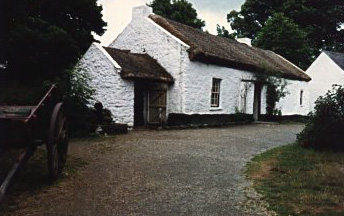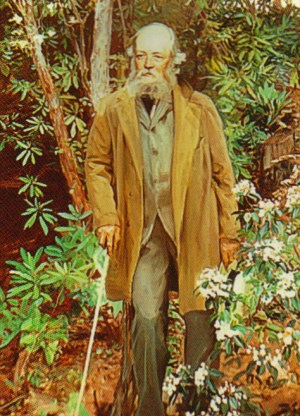A FREE-LABOR FARM.

----,
--. I have been visiting a farm, cultivated entirely by free-labor. The
proprietor told me that he was first led to disuse slave-labor, not from any
economical considerations, but because he had become convinced that there was
an essential wrong in holding men in forced servitude with any other purpose
than to benefit them alone, and because he was not willing to allow his own
children to be educated as slave-masters. His father had been a large
slave-holder, and he felt very strongly the bad influence it had had on his own
character. He wished me to be
satisfied that Jefferson uttered a
great truth when he asserted that slavery was more pernicious to the white race
than the black. Although, therefore, a chief part of his  inheritance had been
in slaves, he had liberated them all.
inheritance had been
in slaves, he had liberated them all.
Most
of them had, by his advice, gone to Africa. These he had frequently heard from.
Except a child that had been drowned, they were, at his last account, all
alive, in general good health, and satisfactorily prospering. He had lately
received a letter from one of them, who told him that he was "trying to
preach the Gospel," and who had evidently greatly improved, both
intellectually and morally, since he left here. With regard to those going
North, and the common opinion that they encountered much misery, and would be
much better off here, he said that it entirely depended on the general
character and habits of the individual; it was true of those who were badly
brought up, and who had acquired indolent and vicious habits, especially if
they were drunkards, but, if of some intelligence and well-trained, they
generally represented themselves to be successful and contented.
He
mentioned two remarkable cases, that had come under his own observation, of
this kind. One was that of a man who had been free, but, by some fraud and
informality of his papers, was reenslaved. He ran away, and afterwards
negotiated, by correspondence, with his master, and purchased his freedom. This
man he had accidentally met, fifteen years afterwards, in a Northern city; he
was engaged in profitable and increasing business, and showed him, by his
books, that he was possessed of property to the amount of ten thousand dollars.
He was living a great deal more comfortably and wisely than ever his old master
had done. The other case was that of a colored woman, who had
obtained her freedom, and who became apprehensive that she also was about to be fraudulently made a slave again. She fled to Philadelphia, where she was nearly starved, at first. A little girl, who heard her begging in the streets to be allowed to work for bread, told her that her mother was wanting some washing done, and she followed her home. The mother, not knowing her, was afraid to trust her with the articles to be washed. She prayed so earnestly for the job, however--suggesting that she might be locked into a room until she had completed it--that it was given her.

A view of Philadelphia
So
she commenced life in Philadelphia. Ten years afterwards he had accidentally
met her there; she recognized him immediately, recalled herself to his
recollection, manifested the greatest joy at seeing him, and asked him to come
to her house, which he found a handsome three-story building, furnished really
with elegance; and she pointed out to him, from the window, three houses in the
vicinity that she owned and rented. She showed great anxiety to have her
children well educated, and was employing the best instructors for them which
she could procure in Philadelphia.
![]() A Free labor farm Olmsted Journey in the
Seaboard Slave States.
A Free labor farm Olmsted Journey in the
Seaboard Slave States.
1853-1854.
